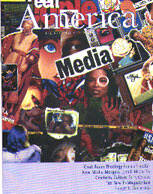I was supposed to be doing research for an academic assignmentyet another paper. I hated the task as soon as I read the syllabus. Seeking additional sources for information, I turned to the World Wide Web. For me, the world of cyber-information created as many diversions as a library card catalog, a book’s table of contents or any encyclopedia. I always seemed to be diverted from what I was looking for, fascinated by the path indeed taken, which usually led me away from the original point of my intellectual curiosity. I have always been the kind of person who thumbs through a magazine from back to front.
The familiar male voice of "You’ve got mail!" fame has long been a fixture in my home. The advertising-heavy content of America Online has become familiar to my wife and 11-year-old son, both of whom seem to have personally decided to boost the trading value of eBay stock by virtue of their frequent online purchases. My elder son, 14, has a weakness for "Instant Messaging," which allows him to maintain the prerequisite four conversations at once with his similar "slacker-in-training" teen friends. My own weakness was much more insidious, much more truly communitarian, an affection for the "chat room."
A former computer instructor and media specialist in two Catholic schools, I had been weaned on the Internet from its earliest pre-"cyber-chic" days. Many years ago I had decided to subscribe to America Online, as an easy-to-use entry point for my family into the world of cyberspace. While my preference would have leaned more to the utilitarianism of simple e-mail and Web browser availability, this was, after all, going to be the family computer. I had to think of functionality.
So rather than looking up information on my chosen subject, I was instead led to something called "Being Catholic" in the chat room forum. Now then, I thought, this has some potential for curious, insightful, intriguing dialoguea chance to engage in some enlightening theological discourse with other inquiring minds. What I found, instead, were some pretty outlandish dialogues, focusing on topics from the sublime (the historical ethnicity of Jesus) to the ridiculous (Did Adam and Eve have belly buttons?). I wondered if this was the state of theological cyberdiscoursea hit-or-miss hodgepodge of opinionated, bargain-basement, wannabe theologians.
Maybe I just had a bad experience. To test my theory, I returned each day for a week only to discover that I wasn’t wrong at all. The conversations continued to digress into the fringes of religious irrelevance, ranging from what I termed "conservative ostrich-thinking" ("Why do we always have to question the authority of Rome? We should just get down on our knees and thank God for the church!") to "nouveau liberals" ("I think women should be priests and get married and have children, and we should be able to use any bread for the Eucharist"). Rarely did I note the presence of tolerance or patience for an opinion expressed or an idea conveyed in opposition to one held dear by another chat room participant. It was as if the very concept of consideration for an alternative viewpoint was rejected outright because it might shake loose longstanding personal foundations.
As a convert, I loved the way Catholics used languages other than English to explain concepts of significance. (Encountering words like Weltanschauung and Geschichte increased my appreciation for such terms.) Some time ago I asked one of our monsignors what aggiornamento meant in English. His explanation of it as "a fresh breeze blowing in through a just-opened window" made sense to me both as a verb and as a visual picture. "It was the Pope’s term," he said. Its meaning has stayed with me not just as the defining statement of the Second Vatican Council, but also as a guide for what I need to do in my own personal "theological house." Aggiornamento, I decided, was missing from my chat room experiences.
For aggiornamento to occur, one must first "open the window" by at least considering another’s deeply held belief. Not taking this step was the essential failure of most persons in the chat room. They seemed to hold fast so steadily and so mightily to their convictions that they were missing the essential point. That "fresh breeze" of which Pope John XXIII spoke is the necessary ingredient for me, as it challenges me to consider exactly what it is that I do believe. It is the missing element in the cacophony of opinionated idealists who inhabit many of these rooms, where persons speak as if from "on high" on matters of dogma, doctrine and discipline. It was as if typing in color and capital letters alone carried the force and authority of "Mother Church"!
Perhaps the best thing about my foray into chat room theology was responding to a young man who entered the chat room apparently in some pain and confusion. There was something about his appeal for answers that seemed genuine. In a private message, I informed him right off that I was not a priest but that I was willing to practice the "ministry of the ear" with him. That, he said, was enough. Like most of us, he just wanted someone to talk to. He was having a hard time seeing Christ in his life; he was down and quite depressed. With that, my new cyberfriend, the Holy Spirit and I took a walkjust some new and old friends doing what new and old friends are able to do online: taking a cyber-"Emmaus Walk" together.








